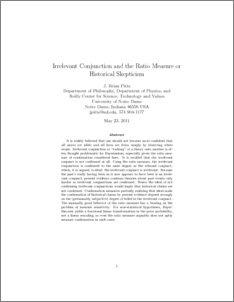Pitts, J. Brian
(2011)
Irrelevant Conjunction and the Ratio Measure or Historical Skepticism.
[Preprint]
![[img]](https://philsci-archive.pitt.edu/style/images/fileicons/application_pdf.png)  Preview |
|
PDF
IrrelevantConjunctionRatio.pdf
- Accepted Version
Download (4MB)
|
Abstract
It is widely believed that one should not become more confident that _all swans are white and all lions are brave_ simply by observing white swans. Irrelevant conjunction or "tacking" of a theory onto another is often thought problematic for Bayesianism, especially given the ratio measure of confirmation considered here. It is recalled that the irrelevant conjunct is not confirmed at all. Using the ratio measure, the irrelevant conjunction is confirmed to the same degree as the relevant conjunct, which, it is argued, is ideal: the irrelevant conjunct is irrelevant. Because the past's really having been as it now appears to have been is an irrelevant conjunct, present evidence confirms theories about past events only insofar as irrelevant conjunctions are confirmed. Hence the ideal of not confirming irrelevant conjunctions would imply that historical claims are not confirmed. Confirmation measures partially realizing that ideal make the confirmation of historical claims by present evidence depend strongly on the (presumably subjective) degree of belief in the irrelevant conjunct. The unusually good behavior of the ratio measure has a bearing on the problem of measure sensitivity. For non-statistical hypotheses, Bayes' theorem yields a fractional linear transformation in the prior probability, not a linear rescaling, so even the ratio measure arguably does not aptly measure confirmation in such cases.
Available Versions of this Item
-
Irrelevant Conjunction and the Ratio Measure or Historical Skepticism. (deposited 25 May 2011 16:03)
[Currently Displayed]
Monthly Views for the past 3 years
Monthly Downloads for the past 3 years
Plum Analytics
Actions (login required)
 |
View Item |




